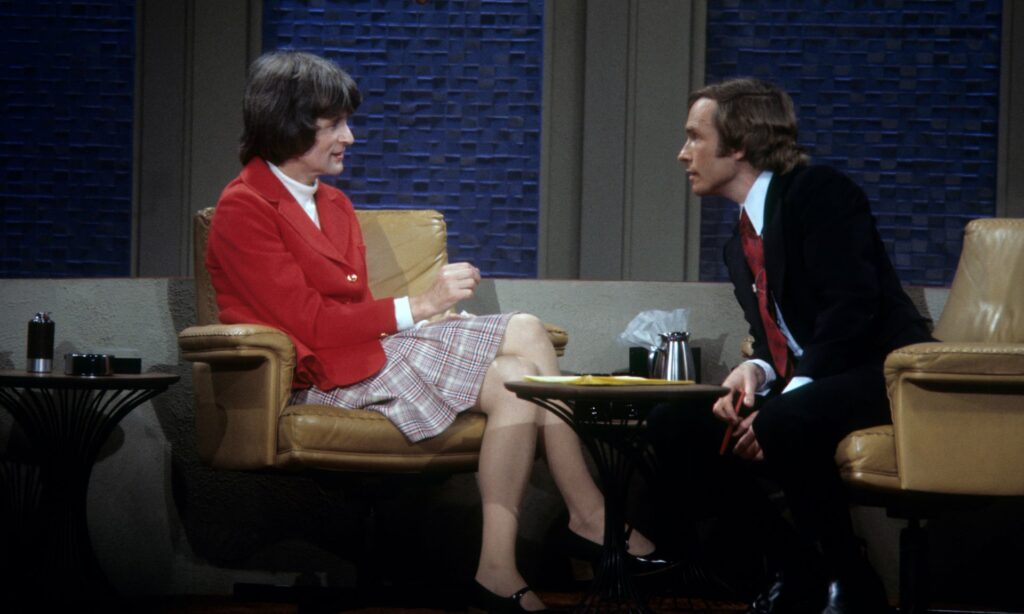
Den brittisk-walesiska författarinnan och historikern Jan Morris längsta resa var inte någon av henne färder till fjärran platser på jorden utan mellan extraordinära identiteter, skriver The Guardian, sedan Morris avlidit den 20 november, 94 år gammal.
James blev Jan 1974, 48 år gammal, på en tid när könsbyte var outforskat territorium, utforskade världens som feministisk journalist och skrev en lång rad djupt originella reseböcker.
Jag såg och lyssnade på Jan Morris när hon besökte bokmässan för att tala om sin ”Trieste and the Mening of Nowhere”.
Böcker sätter igång fantasin och fantasin inspirerar till resor. Efter att ha läst några sidor i Morris Triestebok var jag på väg till staden. Det var en resa som också blev inledningen till arbetet med en egen livs- och resebok, med en av Jan Morris inspirerad titel, ”Hemma i Ingenstans. Resor till städer”.
Trieste var en speciell stad för Jan Morris, en plats där hon kunde vara sig själv. ”Det finns platser där man kan vara sig själv, skrev hon, ”städer där det lever människor med ett slags humor, förståelse och tolerans, folk som inte bryr sig om din ras, din tro, dit kön eller din nationalitet. Dessa människor lever i exil och tillhör nationen Ingenstans”, skrev hon och fortsatte ”och jag har kommit att tro att dess naturliga huvudstad är Trieste.”
Jan Moris besökte Trieste första gången 1946 då han kom till staden som brittisk soldat. Han kom att beskriva Trieste som sitt hemma, ”en plats för människor med utanförskap, med känsla för ingenstans och livets mening”.
Bland Morris många böcker från världens alla hörn kan nämnas Venice, en biografi om Venedig, och kanske också hennes allra sista bok, Thinking Again, en reflexion om livet och tidens gång.
Fotnot: I en annan artikel i The Guardian skriver sex brittiska reseförfattare om henne. Jag kan inte låta bli att citera en av deras texter, skriven av Kapka Kassabova:
”In my 20s, when I was living in Dunedin, then Wellington and Auckland, trying to survive as a student and later as a writer in a language I had only started learning a few years earlier, Jan Morris was my lifeline to the world. The actual world that I was hungry for, and the Writer’s World. I’d open any of her books – and I bought them all, secondhand – and feast on her language, on her expansiveness of experience and perception, her learned and practical worldliness, richer in many more decades than I had been alive and that showed me what literary humanism is: polytheistic, generous, curious, forever open to transforming itself, and ultimately (though I only saw this later) of service to others.Advertisement
Inhaling her sense of place, inhabiting her places as states of mind and soul, was pure oxygen. She had written the book on all that preoccupied me, geographically and existentially: the feeling of nowhere brought by exile, farewells as “premonition of infinity” the rich gifts of the broken-yet-beautiful – these are the best places of course, they call to me like sirens – “to attract and to sadden”. Triestinità, tanguidad, duende, saudade. Yes! When I finally made it to Trieste last year, she was in every street:
“I was the world in which I walked, and what I saw
Or heard felt came not but from myself”
On Trieste’s shore, I realised that all my writing life I had been building on things I had learned from her, among others: how to really see the world and hold it in your gaze, then in your prose, then in your heart – even when you are finished with it. When she endorsed, with typical generosity, my British debut, Street Without a Name, she wrote me an email.
I paraphrase: “In all my wanderings, and even when I changed my gender, I have been privileged to know where I depart from and where I will return to: Wales. But you have experienced a dislocation and a loss like nothing I’ve known – the dislocation of not knowing either your point of departure or your port of return. Keep writing about it!”
As a beginner, I thought her greatness was to have written the world. Now I see that her other greatness is to have offered us the highest truth: “Kindness is all that matters in the end. She said it often and lived and wrote by it. That has now become my own point of departure and my port of return.”

